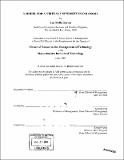A model for a virtual university in Colombia
Author(s)
García, Luz Stella, 1965-
DownloadFull printable version (8.909Mb)
Other Contributors
Massachusetts Institute of Technology. Management of Technology Program.
Advisor
Arnoldo Hax.
Terms of use
Metadata
Show full item recordAbstract
The Colombian government is working on solutions to widen the coverage of higher education which is currently around 21%. One of the solutions to handle this major problem in rural and remote areas, but also in some towns and cities where there is either not enough capacity in the current traditional higher institutions, or its quality is poor, or there is little to no supply is Virtual Education. The current stage of higher distance education in Colombia is characterized by a fragmented supply with weaknesses in defining and adopting a pedagogical model, the use of technology capabilities, the organizational structure to support virtual education, and the planning and quality assurance processes. Institutions offering distance services have opportunities for improvement and innovative developments but they lack the necessary resources. Based on this diagnosis, our challenge in coverage of higher education, and the elements identified from seven international experiences studied, a Virtual University is proposed with the purpose of being an 'Open and distance learning university' with "open" meaning access to everybody and "distance" including the appropriate technologies and pedagogical models to offer distance education. The Virtual University is set up primarily to serve young students and adults from the lowest income levels who have finished their high school education. Three alternatives are described to implement the virtual university: i) a new centralized and autonomous organization, ii) a network of universities under an umbrella of a Virtual University, and iii) free competition among institutions. Finally, the role of the Ministry of Education in higher distance education is developed. The Ministry plays the roles of policy maker, accreditation (cont.) and funding in distance higher education and a leading role in helping in the development of a market of good quality distance programs and creating the conditions for the demand to get access to the new offering. In addition, the Ministry should strengthen institutions to face properly distance education and create the mechanisms for cooperation with international governments and organizations.
Description
Thesis (S.M.M.O.T.)--Massachusetts Institute of Technology, Sloan School of Management, Management of Technology Program, 2004. Includes bibliographical references (leaves 110-113).
Date issued
2004Department
Management of Technology Program.; Sloan School of ManagementPublisher
Massachusetts Institute of Technology
Keywords
Management of Technology Program.